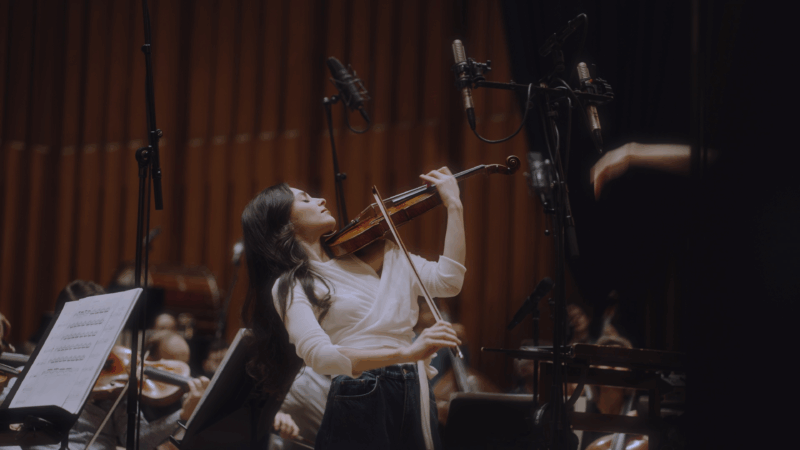Violinist Esther Abrami uncovers ‘hidden treasure’ of music by women
The first time Esther Abrami saw a violin, she was just three years old. Little did she know at the time, it would be the start of a lifelong love affair.
The instrument belonged to Abrami’s late grandmother, Françoise.
“She gave up the violin when she got married,” said Abrami, now a rising violinist who’s toured across Europe and China. “I kind of took where she left and kept going.”
Abrami translates that tale of inspiration in “Transmission,” her first recorded composition, as part of a new album out last Friday. The soaring melody has a cinematic feel, breaking into arpeggiated chords accompanied by the Vienna Radio Symphony Orchestra.
“It’s a composition that I feel very emotional playing, and recording it also felt very special,” Abrami told NPR’s Michel Martin.
The album Women features the world-premiere studio recording of Irish composer Ina Boyle’s Violin Concerto (1935), which evokes bucolic scenes with the feel of a tone poem.
Boyle has largely been forgotten, something she shares with several of the 14 composers and songwriters on the album, including Brazil’s Chiquinha Gonzaga (1847-1935) and Venezuela’s Teresa Carreño (1853-1917).
And so it is rather apropos that the orchestral works on the album are conducted by Irene Delgado-Jiménez, who recently completed a two-year fellowship in the conducting incubator led by Marin Alsop, the first woman to lead a major American orchestra.
Among the living composers on the album are Oscar winners Rachel Portman and Anne Dudley — who are both British — Miley Cyrus via an arrangement of “Flowers” and Yoko Shimomura with her “Valse di Fantastica,” a theme from the video game Final Fantasy XV.

After completing her studies when she was 25, Abrami realized “in all those years, I’d learned hundreds of pieces, but not a single one of them had been written by a woman,” said Abrami, now 28. “And then I started kind of doing my own journey and my own research, and it was like opening the door of a hidden treasure.”
Boyle’s teacher Ralph Vaughan Williams, one of the most celebrated British composers of the early 20th century, reportedly told her: “I think it is most courageous of you to go on with so little recognition. The only thing to say is that it sometimes does come finally.”
And that, perhaps, is the whole point of Abrami’s latest recording endeavor.
“Hopefully, in 10 years, it won’t be needed to have an album titled Women,” she said. “But for now, we still have to do so much, to push so much to be able to even come to something that is close to being equal in terms of, for example, performing works by women. And we are so, so, so far off still.”
Last year, the Donne Foundation, which keeps track of women in classical music, found the number of works by female composers being performed by global orchestras had slightly dropped in the previous season to just 7.5 percent of the repertoire.
Abrami said part of why she’s active on social media is to try to change those numbers and inspire young aspiring musicians. “I see the impact that has on little girls… Little girls who came to my concerts and said that my social media and my videos on YouTube have inspired them to start of the violin, now they are coming to me saying, ‘I played a piece composed by a woman, I asked my teacher to to play a piece composed by woman.'”

Composers like Pauline Viardot were renowned in their time, reduced to an afterthought only after their death. Abrami describes the singer-composer as an influencer in late 19th-century musical circles. Viardot was an early champion of the works of her contemporaries like Georges Bizet, including his Carmen — today one of the most frequently performed operas, but poorly received at its premiere just months before Bizet died.
“She was hosting concerts and parties in her Parisian apartment. All the big figures in the culture world at the time knew her. She was very good friends with [writer] George Sand, but also Chopin and Clara and Robert Schumann, and all these people were coming to them to play with her, to see her,” said Abrami.
Abrami counts Holocaust survivors among her grandparents, and for this year’s International Holocaust Remembrance Day in January, she released Ilse Weber’s “Wiegala” as a single. The haunting lullaby was written by Weber, a poet who served as a pediatric nurse in the Theresienstadt concentration camp in the present-day Czech Republic.
“To calm the children that she was taking care of, what she was doing was composing music and singing to them,” said Abrami. When children in the camp were sent to Auschwitz, Weber voluntarily accompanied them. “It is known that just before going in the gas chamber, one of the last songs that she sang together with the children was ‘Wiegala.'” Abrami’s paternal great-grandfather was also killed at Auschwitz.
The lullaby only survives today because Weber’s husband had hidden her poems and scores at Theresienstadt and retrieved them after the war.
The broadcast version of this story was produced by Barry Gordemer. The digital version was edited by Majd Al-Waheidi.
The airspace around El Paso is open again. Why it closed is in dispute
The Federal Aviation Administration abruptly closed the airspace around El Paso, only to reopen it hours later. The bizarre episode pointed to a lack of coordination between the FAA and the Pentagon.
‘Dawson’s Creek’ star James Van Der Beek has died at 48
Van Der Beek played Dawson Leery on the hit show Dawson's Creek. He announced his colon cancer diagnosis in 2024.
A Jan. 6 rioter pardoned by Trump was convicted of sexually abusing children
A handyman from Florida who received a pardon from President Trump for storming the U.S. Capitol on Jan. 6, 2021, was convicted on state charges of child sex abuse and exposing himself to a child.
A country-pop newcomer’s debut is your reinvention album of 2026
August Ponthier's Everywhere Isn't Texas is as much a fully realized introduction as a complete revival. Its an existential debut that asks: How, exactly, does the artist fit in here?
U.S. unexpectedly adds 130,000 jobs in January after a weak 2025
U.S. employers added 130,000 jobs in January as the unemployment rate dipped to 4.3% from 4.4% in December. Annual revisions show that job growth last year was far weaker than initially reported.
Greetings from Mexico City’s iconic boulevard, where a dog on a bike steals the show
Every week, more than 100,000 people ride bikes, skates and rollerblades past some of the best-known parts of Mexico's capital. And sometimes their dogs join them too.







